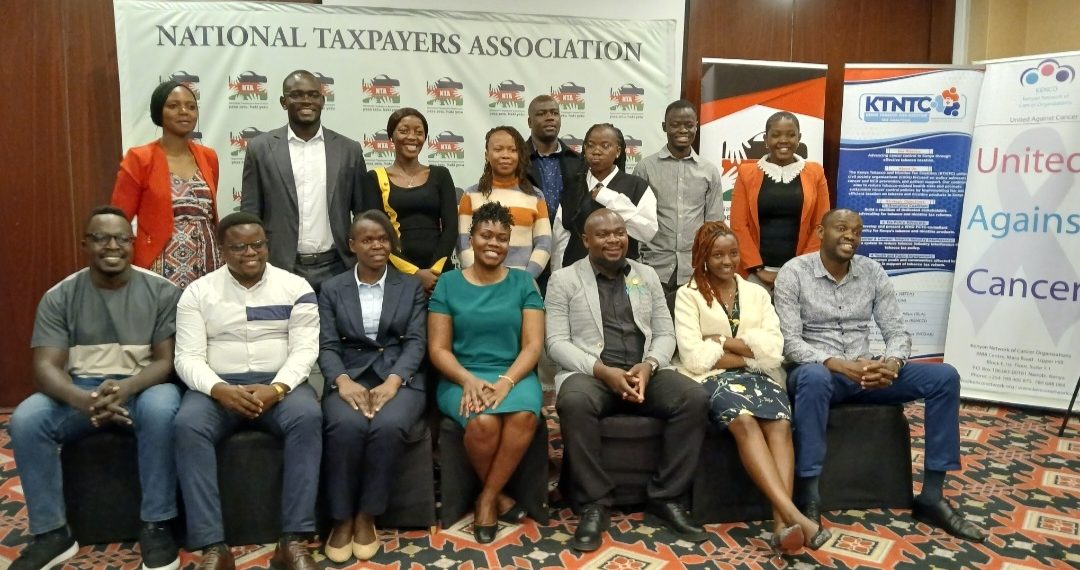A coalition of civil society organizations (CSOs) advocating for tobacco control in Kenya has strongly condemned an alleged partnership between the Ministry of Health and British American Tobacco (BAT), calling it a blatant violation of both national laws and international treaties.
Speaking during a joint press briefing in Nairobi, the Kenya Tobacco and Nicotine Tax Coalition (KTNTC) — an umbrella body comprising prominent anti-tobacco organizations — expressed outrage over a letter allegedly dated May 7, 2025, authored by Principal Secretary Mary Muthoni, inviting BAT Kenya to collaborate on a national health campaign targeting transport sector workers.
Thomas Lindi, Chief Executive Officer of the Kenya Tobacco Control and Health Promotion Alliance (KETCA), said the move is not only unlawful under Kenya’s Tobacco Control Act 2007 but also contravenes Article 5.3 of the World Health Organization Framework Convention on Tobacco Control (WHO FCTC), which Kenya ratified in 2004.
“We reject any form of partnerships and agreements between the Ministry of Health and British American Tobacco, or any other government engagement with the tobacco and nicotine industry that could undermine public health policies in Kenya,” said Lindi. “We call upon security agencies to scrutinize the so-called ‘socially responsible’ activities by the tobacco industry, including corporate social responsibility initiatives, and regulate them according to the law.”
Ken Marau, Head of Programs at the International Institute for Legislative Affairs (IILA), warned that the PS’s letter detailed plans for a presidential campaign launch on June 18, 2025, which includes health outreach programs in 10 counties — with BAT allegedly invited to influence “health-seeking behavior.”
“This is a direct conflict of interest,” said Marau. “Under Section 5(3) of the Tobacco Control Act 2007, no member of the Board shall be affiliated with the tobacco industry. Section 5(4) stipulates that failure to disclose such affiliations constitutes an offence punishable by fines or imprisonment.”
Marau stressed that FCTC provisions are designed to uphold the integrity of public health decision-making, keeping it free from commercial manipulation.
“The PS’s invitation normalizes the presence of the tobacco industry in health promotion, which is a serious deviation from both legal and ethical standards,” he added.
Phoebe Ongandi, CEO of the Kenya Network of Cancer Organizations (KENCO), lamented the growing trend of tobacco industry infiltration into government policy spaces, particularly within the Ministry of Health.
“Kenya is under a legal and moral obligation to reject any collaboration with tobacco companies in health campaigns. The FCTC guidelines are crystal clear — all interactions must be limited, transparent, and documented. This alleged letter does none of that,” she said.
Ongandi warned that such partnerships put vulnerable groups — like long-distance drivers and boda boda riders — at increased risk by legitimizing tobacco use through misleading health campaigns.
“It’s a betrayal of trust. These communities need protection, not manipulation,” she said.
Kevin Oduor, Head of Programs at Stowelink, called on the Ministry to immediately retract the letter and issue a public apology.
He also urged Parliament’s Health Committee, the Ethics and Anti-Corruption Commission (EACC), the Auditor General, and other oversight agencies to investigate the matter thoroughly.
“This is not just about one letter; it’s about safeguarding the integrity of public institutions. Citizens must mobilize, petition, and advocate. We must reinforce the rule of law and protect our public health systems,” said Oduor.
He appealed to international health bodies, including the WHO FCTC Secretariat, to provide technical oversight and ensure Kenya’s compliance with its treaty obligations.
The CSOs noted that this latest development follows a broader and disturbing trend. BAT has previously lobbied for regulatory concessions on nicotine pouches such as Velo, often employing misleading PR campaigns.
“The industry has shifted from lobbying for softer regulations to attempting full participation in national health programs,” the coalition warned in a joint statement. “Kenya’s health policy must not be for sale.”
Erick Omondi from the Students Campaign Against Drugs (SCAD) praised Health Cabinet Secretary Aden Duale’s recent actions, including the revocation of import licenses for nicotine products and the public destruction of five tonnes of illegal nicotine items.
“This sends a clear message that Kenya will no longer tolerate complicity in the trafficking of harmful substances,” said Omondi. “The evidence is clear — nicotine products are harmful and offer no therapeutic benefit.”
Anne Avonde, Programs Officer at the National Taxpayers Association (NTA), urged lawmakers to take decisive action through the 2025 Finance Bill.
“We propose raising taxes on all tobacco and nicotine products to the WHO-recommended 70% of the retail price,” she said. “This will reduce consumption and fund vital health initiatives.”
KTNTC, which includes KETCA, NTA, IILA, KENCO, SCAD, Den of Hope, the Consumers Information Network (CIN), and the Non-Communicable Diseases Alliance of Kenya, vowed to pursue legal action if the Ministry of Health fails to retract the letter and recommit to tobacco-free public health campaigns.
The coalition has called upon all Kenyans to join the movement — write to Members of Parliament, participate in forums, sign petitions, and speak out on social media.
“We stand firm in our resolve,” said David Odhiambo of Den of Hope. “This is about our children’s future, our economy’s backbone, and our nation’s integrity. The Ministry must act now.”
“This is not just a legal issue — it is a moral imperative,” concluded Odhiambo. “Our health is not for sale.”














